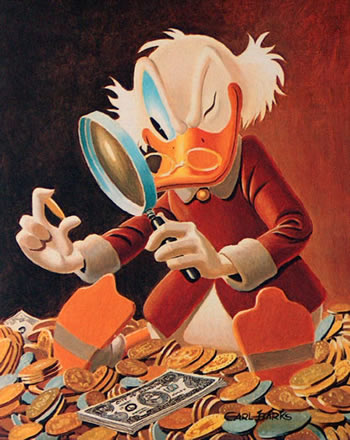
Posted on 09/18/2014 2:31:35 PM PDT by 2ndDivisionVet
A reliable medium of exchange is the biggest obstacle to Scottish independence. Enter the world's leading crypto-coinage.
With Thursday's Scottish independence referendum too close to call, opponents of an independent Scotland have been stressing the would-be country's lack of a reliable currency. An independent Scotland could either keep using the British pound and lose control of its monetary policy, join the eurozone's well-known squabbles, or create a new national currency that's almost certain to be weak. But there's an intriguing fourth option: adopting an online crypto-currency such as Bitcoin.
Scotland actually has some historical experience with this sort of thing: Instead of relying exclusively on the British pound in the 18th and 19th centuries, many Scottish banks issued their own currencies—a fact noted by Guy Debelle, the assistant governor of Australia's central bank, at a recent conference on digital currencies in London. Here's Debelle in the Guardian:
"The Scots can go back to experimenting with a multitude of currencies, Bitcoin and the like, and we can just sit back and see how it goes. A nice natural experiment about the future of money in Scotland—again. Because, as I said, they tried this in the 18th and 19th centuries. It worked for awhile, but eventually fell apart."
In the ensuing discussion, David Birch, the director of the digital currency consultancy Hyperion, argued that Scotland's currency experiment was more successful than one might think. From the Guardian:
"The economic research shows that in Scotland, the bank failures were fewer, and less disruptive, than the bank failures in England at the time," he said. "Competing note issue in Scotland didn't end because it collapsed: it ended because of an outrageous extension of the Bank Act of 1844, which extended the Bank of England's monopoly over note issue north of the border."
But ending the Bank of England's monopoly might not be the biggest problem with Bitcoin. A national Bitcoin-based currency would, practically speaking, resemble one based on gold: Bitcoins are designed to function as a limited commodity that becomes harder to acquire over time. In either case, the result is a highly inflexible national currency that often can't keep pace with economic growth. As Felix Martin points out in the New Statesman, one of the first people to identify this problem was a Scotsman: The economist John Law of Lauriston emigrated to France, became that country's minister of finance, and in 1719 replaced the gold standard with paper money printed at the discretion of the government.
No matter: Edinburgh-based venture capitalist Derek Nisbet recently launched Scotcoin, which is offering 1,000 free Scotcoins to every resident adult. "Our motivation is to empower the Scottish people with an alternative digital currency opportunity," he told the Guardian, "which may be used as a medium of exchange, should the need or wish arise."
For now, at least, it seems like Bitcoin's biggest use in Scotland is as a marketing gimmick. In May, the London electronics retailer CeX got a load of free press when it introduced Scotland's first Bitcoin ATM and briefly turned its Glasgow store into a "pound free zone": For a few days, it only accepted Bitcoin payments. "The trial is turning the Scottish High Street [location] into a Bitcoin laboratory," a CeX spokesman told the website CoinDesk, "highlighting alternative forms of currency should Scotland vote 'yes' in the forthcoming referendum."
The Haggis ,about half the Pound Stirling
Sure, that and carbon credits.
“I woke up and all me bitcoins were gone away”
The ruble, maybe? Soon to be 2 for 5¢!
I mean isn't it a little like opening a new checking account when your present one is overdrawn by a few billion?
The question then becomes, how does ROUK (rest of UK) enforce Scotland paying their share of the debt? That has been the $150 billion question for years, with Quebec continually threatening separation.
They won’t pay it. They’ll cry to the EU.
Does anyone know if Expats were allowed to vote in the election?
My husband is over there and he just said ex pats living in England can’t vote but 16 year old in Scotland can.
Let me take that back, they are not ex pats, they are Scots living in the UK can not vote.
There used to be a Scottish Pound.
If exit polls are halfway accurate, their official currency will remain the British Pound.
There are thousands of Scots working overseas..can they vote like we can in National Elections?
“There are thousands of Scots working overseas..can they vote like we can in National Elections?”
You mean cast 4 absentee ballots and 10 ballots at 10 different precincts?
EMP would have to be global to kill the BC. The block chain is copied world wide and decentralized.

They could mint their own coins, call their currency the Kilt.
Disclaimer: Opinions posted on Free Republic are those of the individual posters and do not necessarily represent the opinion of Free Republic or its management. All materials posted herein are protected by copyright law and the exemption for fair use of copyrighted works.